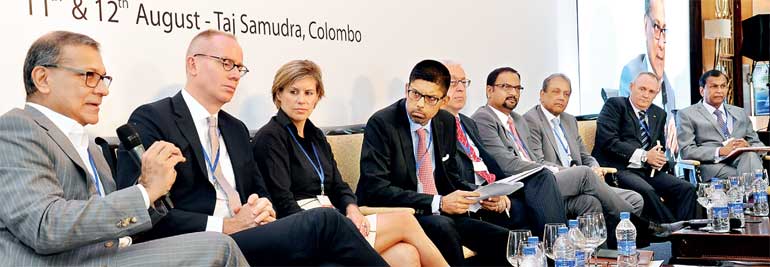Wednesday Feb 25, 2026
Wednesday Feb 25, 2026
Tuesday, 16 August 2016 00:08 - - {{hitsCtrl.values.hits}}
Sri Lanka’s tourism industry needs to set up a world-class private sector driven training institution which will enable the building of the country’s brand to be differentiated by its human capital, an industry expert suggested.
Speaking at the Sri Lanka Human Capital Summit session on the ‘Tourism Pillar’ John Keells Holdings Deputy Chairman Ajit Gunewardene emphasised that image building and training were two key solutions from an HR perspective to cater to the expected influx of 4.5 million tourists by 2020.
 John Keells Holdings Deputy Chairman Ajit Gunewardene speaks at the Sri Lanka Human Capital Summit's Tourism session
John Keells Holdings Deputy Chairman Ajit Gunewardene speaks at the Sri Lanka Human Capital Summit's Tourism session
“I suggest that private sector industry participants take the initiative to set up a world class institute. We should no longer depend on the public sector to provide training. In this ever-changing competitive world, being nimble, relevant and ahead of the curve is crucial. This can be delivered only through a private sector-led initiative,” he said.
Noting that tourism has an impact on the supporting industries such as construction, agriculture, fisheries, transport, retail and so forth, he insisted on the need for a holistic approach in solving this problem, cautioning that if not addressed, tourists would experience negative impacts as inefficiencies in the production and the supply chain costs would escalate.
He proposed redirecting the 1% cess paid to the Sri Lanka Tourism Promotion Bureau (SLTPB) towards funding this initiative as it would certainly add more value in the long term, while continually improving the visitor experience.
“What better marketing, what better promotion can deliver a tourism experience that is considered ‘the best’ in the world and we brand it with our people,” he added.
Voicing a reality check, Gunewardene said the Government would not be able to deliver the quality that is required to set a global benchmark. “The Government doesn’t have the cutting edge resources to recruit trainers, teachers or set the curriculum. They simply cannot afford it.” He emphasised that the school should not be generic, but aligned to the brand proposition on a holistic approach, which would not only have training in hotel management, but support the training of the SME sector, start-ups, guides, chauffers, shop assistance, immigration officers and all tourist touch points.
In terms of building the image Gunewardene went on to say that the industry needs a structured program to change the negative perception of working in the industry. “We must target women who are woefully underrepresented standing at about 5% today. We must show the benefits, we must make this industry glamorous. In fact, it does pay well. It is global in terms of opportunity, and is sustainable as a profession in demand over the longer term. We have just not marketed it adequately,” he added. The perception of low pay, long work hours and lack of confidence in speaking English were highlighted as deterrent factors to attract talent to the industry.